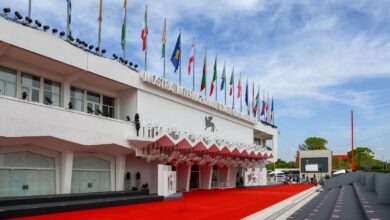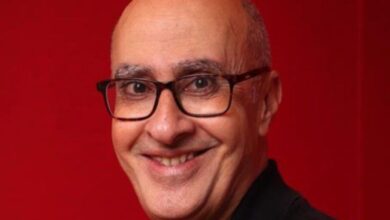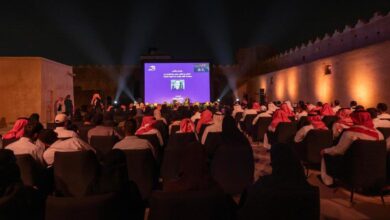ACC’s Equity Financing” Panel Opens New Doors for Arab Cinema at Cannes, Highlighting $180 Million Saudi Investment

At the Cannes Film Festival, the Arab Cinema Center (ACC) held a crucial panel on May 18th, titled “Equity-Based Financing: Pioneering New Financing Avenues for Arab Cinema.” The session, which took place on the Palais’ Main Stage, brought together some of the most influential industry experts and thought leaders in Arab cinema.
The panel is Moderated by Jamal Gomaa, the session included key voices such as Rasha Imam, founder of Yellow Camel Studios; Didar Domehri, founder of Maneki Films; Ahmed Amer, founder of A.A. Films; Soleil Gharbieh, Lebanese Programs Manager at the Arab Fund for Arts and Culture; and Marco Orsini, founder of IEFTA and Bashar Abu Nour, Director of Production Services at the Jordanian Royal Film Commission.Together, they provided valuable insights into the challenges and opportunities shaping the future of Arab cinema.
Opening the session ,Marco Orsini, founder of IEFTA, set the tone by discussing the slow pace of financing in the region and the need for a fresh approach. “Financing has become a challenge depending on where you are located,” he remarked, stressing that for Arab cinema to thrive, filmmakers must create commercially viable films that appeal to private investors.
The first to share their perspective was Rasha Imam, founder of Yellow Camel Studios,emphasized the critical role of realistic, well-managed budgets in attracting private investment to Arab cinema. She explained that while investor interest is growing in the region, many are still navigating the learning curve when it comes to film as a financial venture.
“Private investors aren’t hesitant — it’s not a matter of losing it or winning it. They just need a clearer understanding of how they’ll get their returns. That clarity takes time,” she said.
Rasha highlighted Saudi Arabia as a key player in the region’s film financing landscape. “There’s roughly $180 million in Saudi funding today — but it’s very targeted and focused on ROI. They’re not just investing for cultural value, they’re investing for outcomes. And while we can learn from Western financing models, we must reshape them to fit our local dynamics.”
She also revealed that, as of now, there are no official film funding bundles in Saudi Arabia, but discussions are underway: “We recently had a meeting focused on establishing bundled funding structures. It’s still in early stages, but the direction is promising.”
Through Yellow Camel, Imam works closely with ministries like Culture, Tourism, and Investment to help filmmakers tap into available resources — whether through grants, soft loans, or private equity. “Saudi Arabia has it all — locations, studios, and production capacity. The tools are there. Now it’s about helping filmmakers navigate the system and build sustainable financing pathways.”
The conversation then shifted to the delicate balance between art and commerce, with Didar Domehri, founder of Maneki Films, sharing her experience in navigating the creative and financial sides of filmmaking. “It’s about having a shared vision between the director and the producer that resonates with the audience while securing the necessary financial backing,” Domehri explained.Also underlining that diversity is also a key element — not just creatively, but commercially. Her comments reflected the nuanced role of producers in shaping films that are both artistically compelling and commercially viable.
Ahmed Amer, founder of A.A. Films, discussed the challenge of diversifying film genres in the Egyptian market. “For years, the Egyptian market has been dominated by comedy and action genres,” he observed. He highlighted that most producers avoid films outside these genres, though there are exceptions like Al-Hawa Sultan and Rambo. With the rise of streaming platforms, Amer noted that audiences are now exposed to a wider range of genres, including Japanese cinema. “We need to expand our genres to keep up with changing tastes and reach new audiences,” Amer urged, emphasizing the importance of offering variety in filmmaking.
Soley Gharbieh, Lebanese Programs Manager at the Arab Fund for Arts and Culture, discussed the potential risks of pushing filmmakers too strongly toward seeking investment. She said, “If we push filmmakers towards seeking investment, we might lose a number of films that don’t have commercial value, such as experimental films, but these are valuable and important for cinematic experimentation.” She also emphasized that it’s not the role of funding to address this issue directly but stressed the importance of remaining open to dialogue with potential investors who might be interested in supporting such projects.
In a reflection on the role of private investment in Arab cinema, Marco Orsini identified three types of investors: those who are passionate about supporting the arts, those seeking glamour and recognition, and those who are truly committed to a long-term partnership with filmmakers. “We need investors who are ready to work alongside filmmakers for the long haul,” Orsini said, emphasizing the need for sustainable investment relationships.
The conversation also explored how governmental initiatives are helping to build connections between filmmakers and potential investors. Bashar Abu Nour, Director of Production Services at the Jordanian Royal Film Commission, discussed how his organization is actively working to facilitate these connections. “It’s a process, and it will take time, but we are building a solid foundation for future success,” Abu Nour stated, reflecting on the challenges and potential of growing film industries in the region.
Wrapping up the session, Didar Domehri expressed her optimism about the increasing support for filmmakers in the Arab world, particularly with the rise of new grants and funding opportunities. “Last year, we saw a significant increase in grant availability, which allowed many filmmakers to bring their visions to life and showcase them on the global stage,” Domehri said, noting that films with strong local narratives are resonating well internationally.
The panel concluded with a message of hope for the future of Arab cinema. Despite the challenges, the industry is showing strong signs of growth. With increased collaboration between the public and private sectors, along with a growing recognition of the importance of cultural diversity in filmmaking, Arab cinema is poised for continued success. The audience left the session inspired and optimistic, encouraged by the discussions and eager to see how the future of Arab cinema will unfold in the coming years.
The panel’s interactive nature, with the audience engaging directly with the experts, made it clear that there is a shared passion for driving the industry forward. Many attendees expressed their gratitude for the candid conversations and the shared vision of building a sustainable, creative, and financially viable film industry in the Arab world.
If you’d like to experience the full panel discussion yourself, you can watch it here.






